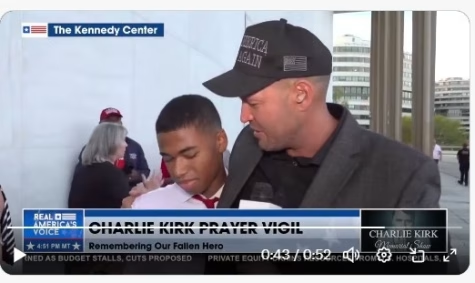Washington, D.C. — On Sunday night, the Kennedy Center became more than a venue. It became a sanctuary. Thousands waited in long lines to attend a moving vigil for Charlie Kirk, the conservative leader whose shocking assassination earlier in the week, has left a nation reeling. The line stretched across the plaza, and among those waiting, a short video captured by Ben Bergquam went viral.
In the clip, Bergquam approaches a 14-year-old young man who had come alone to the vigil. The boy stood quietly, waiting his turn to enter. Bergquam didn’t just interview him—he prayed with him, right there in line. That moment, profound but straightforward, has been shared across platforms as a symbol of the weekend’s deeper meaning: revival.
“He was my idol. I remember watching his videos wanting to be like him. Like, I’ll just see the way he would debate, and he stayed calm while the left was just yelling at him, and he was just so nice about it. And then they hated him so much because he, he knew that he knew he was right, but they just didn’t want to admit it. So they ended up hating him, hating him, and they just killed him for it.”
The young man’s statement is both raw and heartbreaking. It shows how deeply Charlie Kirk impacted the next generation — not just politically, but as a model of calm conviction under fire.
WATCH:
What unfolded over the past 48 hours was more than mourning—it was a spiritual surge. Thousands across the country posted testimonies on social media that they had gone to church for the first time. Some said they went because, as one message put it, “Charlie can’t go, so I will.” Others filmed themselves in parking lots, just before stepping into church doors for the very first time, inspired by the life and words of Kirk.
One testimony in particular struck a chord. A woman, a Democrat and openly gay, shared through tears that she walked into a church expecting rejection. Instead, she was embraced. She recorded her testimony saying she now understood what Charlie Kirk meant when he said that Jesus accepts people as they are. Her raw, emotional video spread rapidly, becoming a centerpiece of the weekend’s online revival.
This wasn’t an isolated story. Floods of short, heartfelt clips filled feeds—ordinary Americans, stunned by Kirk’s death, reporting extraordinary steps of faith. Some spoke of forgiveness, others of courage, and many of a newfound hope. The collective theme was unmistakable: grief had cracked open a door, and revival was rushing through it.
The Kennedy Center itself felt the weight of this moment. Officials reported extensive wait times as thousands pressed in to pay their respects. The atmosphere was heavy with loss but equally alive with expectation. Many who attended spoke of a sense of unity, strangers praying together, and tears shared without hesitation.
Yet beneath the spiritual awakening ran another current: frustration with the way Kirk has been portrayed in mainstream coverage. For many, the outpouring of grief and love does not match the media’s narrative. Instead of hate, they say, Kirk’s death has sparked faith, compassion, and a return to church pews.
Ben Bergquam’s video of the 14-year-old boy praying has come to symbolize the heart of the weekend. It was not about politics or debate—it was about the next generation finding hope through tragedy. One child’s quiet strength, one journalist’s prayer, and a nation’s collective mourning became the seeds of revival.
The Kennedy Center vigil may be remembered not just as a memorial, but as a turning point. Out of pain, a fresh wave of faith has emerged—thousands strong, unplanned, undeniable.
